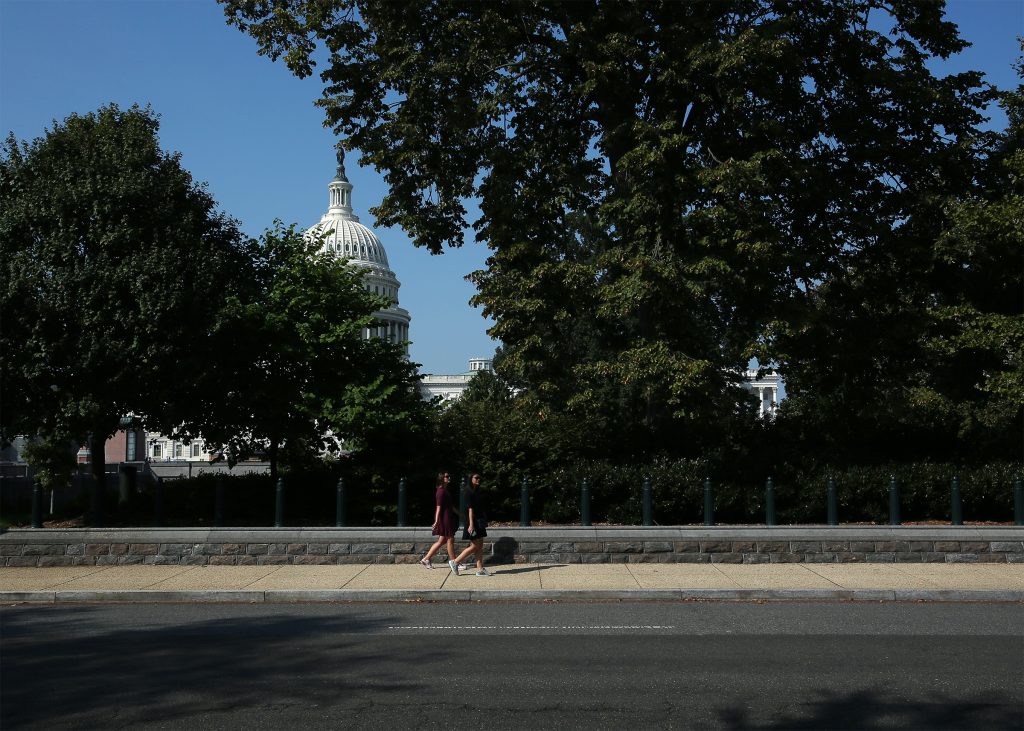American nationalism can be a force for unity that serves the common good when a country strives to open opportunities for all members of society despite their religious or ethical traditions, said participants in a Washington symposium.
Just the same, the symposium heard, it's when nationalist views seek to limit participation by those who are not part of mainstream society or identify other countries as inferior that warning flags should be raised about the commitment to supporting broad-scale rights and meeting human needs.
The discussion during the "God, America and Nationalism" program Oct. 8 at the National Press Club examined the wide forms of nationalism, focusing in part on whether such views met the Christian understanding of the need to serve the common good.
Speakers outlined the nature of how Americans view the country and how those views influence their thoughts on nationalism. Following two keynote addresses and two panel discussions, the program left the small audience with deep questions to consider about the nature of nationalism as most commonly expressed in the 21st-century U.S.
Nationalism can have numerous definitions, most of which are rooted in an individual's beliefs, speakers said, ranging from a more encompassing view that finds a country responding to its citizens' needs primarily to the realm of fascism, which places one country above all others and the use of military force to entrench such views.
Most speakers, however, tracked a middle ground, comparing nationalism to patriotism and the care for one's country.
Joseph Capizzi, executive director of the Institute for Human Ecology at The Catholic University of America, raised concern about how nationalism is commonly expressed in the country today -- that the country's interests should rise above all others -- and said, as a Catholic, he finds the notion troubling.
"Catholic political thought cannot embrace the term nationalism, at least as offered today," he said, explaining the term is often used to invoke a narrow vision of America that seeks to exclude competing political views.
He said Catholic teaching is based on civic friendship, "a great good," under which shared interests and goals unite society. "Without that kind of civic friendship, it's hard to imagine a flourishing national community," he said.
Nationalism, when exercised to promote that friendship -- the common good -- can be a positive force, he said.
"There's a common good that includes all people and those who are in positions of political authority are accountable not merely to their own political communities ... they are also accountable to the greater common good and the lesser common good," Capizzi explained.
Speakers also examined how some Americans equate nationalism with patriotism, explaining that in most such cases the term has no conflict with traditional Christian teaching as long as it is not exclusionary.
During the session with Capizzi, Jim Antle, editor of The American Conservative magazine, acknowledged that some forms of nationalism conflict with Christian beliefs. He defined a "desirable" form of nationalism that he believed was compatible with Christianity in which the primary duty of government is to support "human flourishing and liberty for its people and not becoming involved in global economic efficiency or the international community.
However, he added, nationalism is often criticized
"Nationalism is quite frequently used by people who frequently disagree with nationalism to be simply patriotism I don't like and nationalism that I do like is patriotism. Patriotism I don't like is nationalism. So nationalism in that way inherently gets some baggage when it is used in that way," Angle said.
Carrying out such a vision of nationalism can be difficult, Angle acknowledged, because of America's diversity, histories and differing political beliefs.
The challenge for an American civic nationalist is to forge and strengthen and sort of do what is possible institutionally and politically to preserve and enhance a common national identity without transgressing against greater goods and losing a concept of shared humanity," he said.
In an earlier discussion, two panelists examined the evolution of nationalism.
Samuel Goldman, associate professor of political science at George Washington University, traced the history of modern-day nationalism from colonial America in the late 18th century through the 20th century, saying that it was easier to have one nationalist vision early in the country's history because it was less diverse.
As the idea of the country being a melting pot emerged by the early 20th century, nationalism began to mean different things to different people, Goldman explained.
He pointed to immigration restriction laws and other legislative efforts in the early 20th century that led nationalism to develop into more of a creed as people tried to preserve the earlier traditions of the nation.
Paul Miller, professor of the practice of international affairs at Georgetown University, contrasted the creedal views of nationalism from the country's early history that was rooted in Anglo-Protestantism with broader cultural views of nationalism that emerged from a diversifying nation.
Miller urged the audience to understand that it is not necessary to accept that modern-day liberal democracies are limited to only those countries that subscribe to Anglo-Protestant cultural norms. He pointed to nations around the world that are neither Christian nor founded by Anglo-Saxons in which democracies flourish.
He called for a people to emphasize the creedal understanding of American identity with "full confidence that we can perpetuate our liberal Democratic cultural norms far in the future whether we remain a Judeo-Christian nation."
The symposium was a collaboration between Providence, a magazine of Christianity and American foreign policy, and CUA's Institute for Human Ecology.

